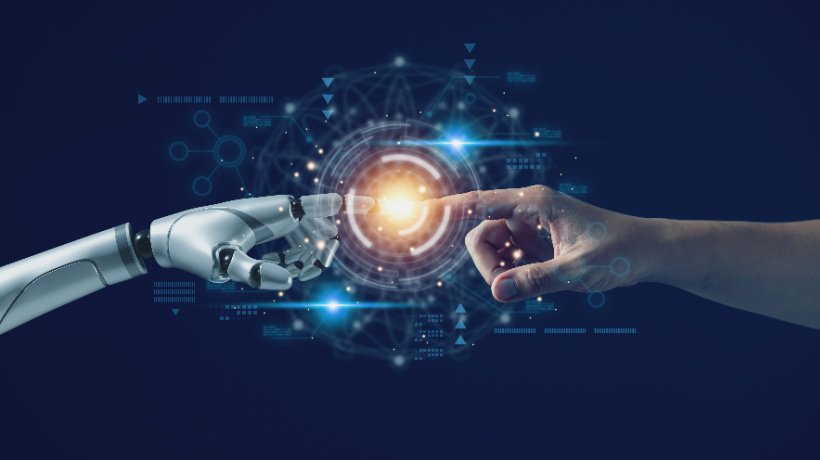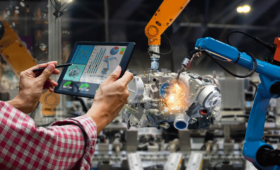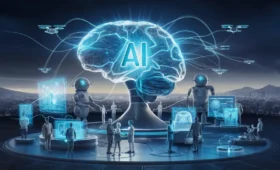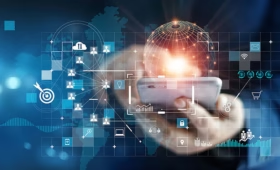Technology is evolving at an unprecedented pace, transforming industries, societies, and everyday life. As we look toward the future, several key trends and innovations are shaping the next wave of technological advancement. From artificial intelligence to quantum computing, the future of tech promises to bring breakthroughs that will fundamentally change how we live, work, and interact with the world. So, what are the main forces driving this transformation? Let’s dive into the most influential factors shaping the future of technology.
1. Artificial Intelligence (AI) and Machine Learning
AI has been at the forefront of technological innovation for some time, but its influence is only going to grow. Machine learning, a subset of AI, enables computers to learn from data and improve over time without being explicitly programmed. This makes AI incredibly powerful in fields ranging from healthcare and finance to marketing and customer service.
In the future, AI will continue to automate complex tasks, assist with decision-making, and offer personalized experiences. Self-driving cars, AI-driven medical diagnoses, and intelligent virtual assistants are just the beginning. As AI algorithms become more sophisticated, they will be able to predict trends, optimize processes, and even create new solutions to previously unsolvable problems.
Moreover, ethical AI is an area of intense focus. As AI systems become more integrated into society, ensuring that they are transparent, unbiased, and accountable will be critical to their success and acceptance.
2. 5G Connectivity
The rollout of 5G networks is poised to reshape the digital landscape. With significantly faster speeds, lower latency, and greater connectivity than previous generations, 5G will enable a wide range of new applications and innovations.
For industries like healthcare, 5G will facilitate real-time remote surgeries, telemedicine, and the rapid sharing of medical data. For autonomous vehicles, 5G will provide the low-latency communications necessary for quick decision-making and safety in real time. Smart cities, powered by 5G, will be able to use interconnected devices to optimize traffic flow, reduce energy consumption, and improve quality of life for residents.
The rollout of 5G will also accelerate the Internet of Things (IoT) by connecting billions of devices worldwide, further blurring the lines between the physical and digital worlds.
3. Quantum Computing
Quantum computing is an area of tech that has the potential to revolutionize industries by solving complex problems much faster than classical computers. While quantum computers are still in the early stages of development, they promise to unlock incredible power in fields like cryptography, materials science, and artificial intelligence.
Quantum computers rely on quantum bits (qubits), which can exist in multiple states simultaneously, allowing them to process information exponentially faster than traditional binary systems. In the future, quantum computing could accelerate drug discovery, optimize supply chains, and break through barriers in scientific research that classical computers can’t currently solve.
However, the technology also brings with it challenges, including the need for stable qubits and the potential for disrupting current cryptographic systems. Still, the ongoing development of quantum computing represents one of the most exciting frontiers in technology.
4. Blockchain and Decentralized Technologies
Blockchain technology, best known for its role in cryptocurrency, is gaining traction in a variety of industries due to its ability to provide secure, transparent, and decentralized systems. It has the potential to disrupt everything from finance and supply chains to healthcare and voting systems.
In the future, blockchain could help streamline cross-border payments, improve the traceability of goods in supply chains, and provide a more secure and transparent means of recording transactions. Decentralized finance (DeFi) platforms, powered by blockchain, are already challenging traditional banking systems and offering alternative ways for people to access financial services.
Beyond finance, blockchain’s ability to securely store and share data will impact sectors like healthcare, where it could help manage patient records and enable secure, cross-border collaboration on medical research. Similarly, blockchain could help authenticate digital art and collectibles, creating opportunities for the booming non-fungible token (NFT) market.
5. Augmented Reality (AR) and Virtual Reality (VR)
AR and VR are transforming the way we interact with digital content and the physical world. VR immerses users in entirely digital environments, while AR overlays digital information onto the real world. Both technologies are being utilized in gaming, entertainment, training, and design, and their applications are rapidly expanding.
The future of AR and VR is likely to include more immersive experiences, especially in areas like education, healthcare, and retail. For example, VR could be used to simulate real-life scenarios for medical students or first responders, while AR could enhance in-store shopping experiences by allowing customers to visualize products in their homes before making a purchase.
As the hardware becomes more affordable and content creation tools improve, AR and VR are expected to become mainstream technologies that reshape entertainment, work, and education.
6. Robotics and Automation
Automation is changing how we work and live. Robots are increasingly being used in manufacturing, agriculture, healthcare, and logistics to perform repetitive, dangerous, or complex tasks. As robotic technology advances, we can expect to see more sophisticated robots that can perform tasks in unstructured environments, like home cleaning or personal assistance.
The integration of AI with robotics is particularly promising. Autonomous robots equipped with AI can learn from their surroundings, adapt to new situations, and make decisions without human intervention. This has implications not only for industries like manufacturing and logistics but also for areas like elderly care and emergency response.
The rise of automation also brings with it challenges related to job displacement and the need for workers to retrain and adapt to new roles. As robots take over more tasks, the focus will shift toward finding ways to work alongside machines and leverage their capabilities to improve productivity and efficiency.
7. Biotechnology and Genomic Advances
The intersection of technology and biology is another exciting frontier. Advances in biotechnology, genomics, and gene editing are enabling scientists to better understand the human genome and develop targeted therapies for diseases.
CRISPR-Cas9, for example, is a groundbreaking gene-editing tool that allows scientists to make precise changes to DNA. In the future, CRISPR and similar technologies could be used to cure genetic diseases, create more resilient crops, and even reverse the aging process.
Personalized medicine, where treatments are tailored to an individual’s genetic makeup, is also on the rise. This could revolutionize healthcare, offering more effective treatments with fewer side effects.
8. Sustainability and Green Tech
As the world faces climate change and environmental degradation, technology will play a critical role in driving sustainability. Innovations in renewable energy, electric vehicles (EVs), energy storage, and carbon capture are helping to reduce humanity’s carbon footprint and shift toward more sustainable practices.
Green technologies like solar power, wind energy, and battery storage are becoming more efficient and cost-effective, while electric vehicles are expected to become mainstream as automakers transition away from fossil fuel-powered cars. Additionally, AI and IoT can help optimize energy use in homes and cities, reducing waste and promoting sustainability.
The future of tech will undoubtedly include a greater focus on sustainable development, as companies and governments work to balance technological progress with environmental responsibility.
9. Cybersecurity and Privacy
As digital transformation accelerates, the need for robust cybersecurity becomes increasingly important. The rise of connected devices, cloud computing, and AI-driven systems has made it easier for cybercriminals to launch sophisticated attacks.
In the future, cybersecurity will become more advanced, leveraging AI and machine learning to detect threats in real time, identify vulnerabilities, and respond to attacks more effectively. Blockchain technology may also play a role in securing online transactions and protecting sensitive data.
Privacy, too, will be a growing concern as more personal information is collected and stored online. Technologies like encryption, zero-knowledge proofs, and decentralized data storage could help address privacy issues and ensure that individuals have greater control over their digital identities.
Conclusion
The future of tech is being shaped by a convergence of several transformative forces. AI, 5G, quantum computing, blockchain, AR/VR, robotics, biotechnology, and sustainability are not just isolated trends—they are interconnected. As these technologies evolve and intersect, they will create new opportunities, challenges, and innovations that will reshape industries and society.
The key to navigating the future of tech will be embracing these advancements while addressing the ethical, environmental, and societal implications. The next wave of technological progress has the potential to improve lives, solve global challenges, and unlock new realms of possibility. As we look ahead, it’s clear that the future of tech will be defined by innovation, collaboration, and a commitment to creating a better world.




